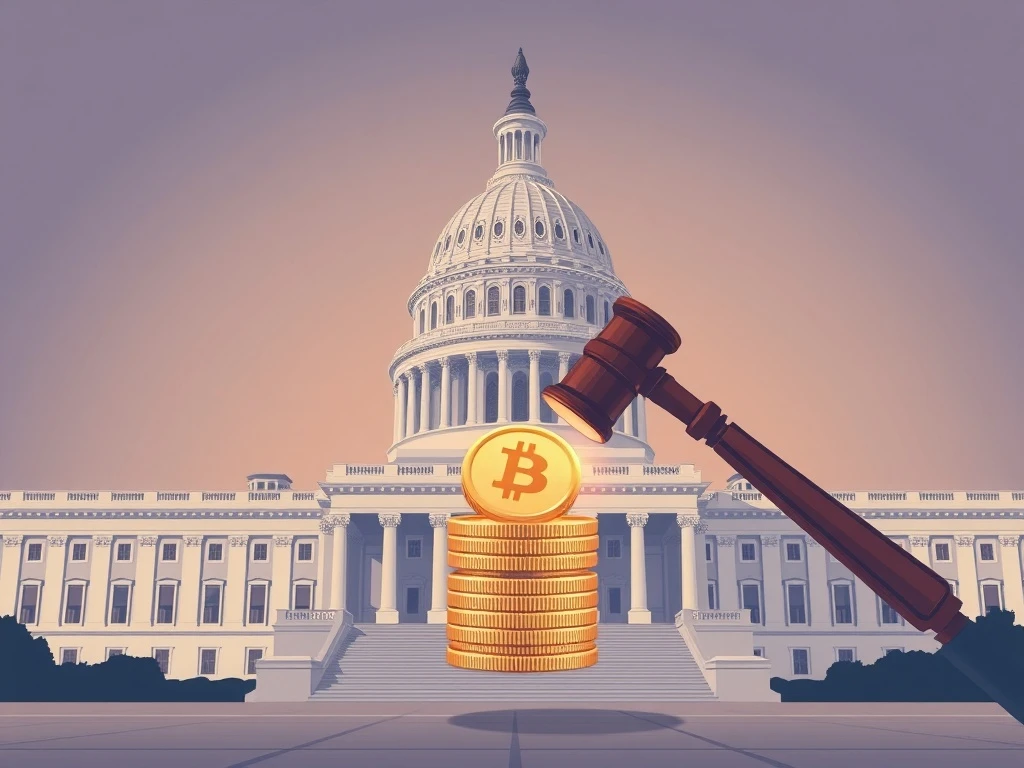Crypto Market Structure: Ex-CFTC Chair Issues Urgent Warning on Conflicts of Interest

The cryptocurrency world is buzzing with anticipation as the US Senate Banking Committee’s digital assets subcommittee convenes a crucial hearing. At the heart of the discussion is a stark CFTC Warning from former Commodity Futures Trading Commission (CFTC) Chair Rostin Behnam, highlighting the critical need to address Conflicts of Interest Crypto and establish a robust regulatory framework. This pivotal moment could redefine the landscape for digital assets in the United States, impacting everything from investor protection to market stability. Why is this warning so urgent, and what does it mean for the future of Crypto Market Structure?
The Urgent Need for a Clear Crypto Market Structure
Former CFTC Chair Rostin Behnam delivered compelling testimony before the Senate, stating that the current trajectory for digital assets is ‘not sustainable.’ His message was clear: without addressing significant gaps, particularly concerning Crypto Market Structure, the financial system faces increasing risks. Behnam’s recommendations focused on three core pillars essential for a resilient market:
- Customer Protections: Ensuring safeguards are in place to shield investors from potential harm.
- Avoidance of Conflicts of Interest: Implementing measures to prevent situations where an entity’s self-interest could undermine market integrity.
- Market Resiliency: Building a framework that can withstand shocks and maintain stability even during volatile periods.
He emphasized that inaction would only escalate dangers, leading to a lack of transparency, fraud, market manipulation, and corruption. As digital assets become more intertwined with traditional financial institutions, concerns about broader financial stability grow. This hearing marks a significant step towards developing comprehensive legislation to bring clarity and stability to the burgeoning crypto sector.
Navigating Digital Asset Regulation: A Bipartisan Challenge
The Senate’s efforts to craft a digital asset market structure framework run parallel to ongoing initiatives in the House of Representatives. The House is considering its own bill, the Digital Asset Market Clarity, or CLARITY Act, which advanced out of committee in June and is poised for a floor vote. This dual legislative push underscores the growing recognition among lawmakers that effective Digital Asset Regulation is no longer optional but imperative.
Republican leadership on the digital assets subcommittee has outlined key objectives for any new crypto market structure bill:
- Clear Legal Status: Explicitly defining the legal classification of various digital assets.
- Allocated Authority: Distributing regulatory authority among agencies to prevent any single ‘all-encompassing’ regulator.
- Investor Protection: Prioritizing safeguards for individuals who trade or purchase cryptocurrencies.
Wyoming Senator Cynthia Lummis, who chairs the digital assets subcommittee, voiced a common sentiment within the industry: ‘While the European Union and Singapore have established clear regulations, the US continues to sit on the sidelines while the digital asset industry seeks greener pastures. That changes today.’
US Crypto Legislation: The Road Ahead
The push for bipartisan US Crypto Legislation is evident, with many Democrats joining Republicans to advance bills aimed at regulating the digital asset space. A recent example is the Guiding and Establishing National Innovation for US Stablecoins, or GENIUS Act, which passed the Senate on June 17 and now heads to the House. This signals a willingness across the political spectrum to engage with crypto regulation, despite some internal party divisions.
However, the debate is not without its complexities. Massachusetts Senator Elizabeth Warren, a vocal critic of former President Donald Trump’s ties to the crypto industry, may raise concerns about potential Conflicts of Interest Crypto during the hearing. Senator Warren voted against the GENIUS Act and has previously highlighted issues related to the Trump family’s stake in World Liberty Financial, a stablecoin issuer. This adds a layer of political scrutiny to the legislative process, emphasizing the need for transparency and ethical considerations in the development of new laws.
What Does the CFTC Warning Mean for Investors?
The CFTC Warning from Rostin Behnam is a direct call to action for lawmakers to prioritize investor protection. His testimony underscored the inherent risks in an unregulated market, including:
| Risk Factor | Description |
|---|---|
| Lack of Market Transparency | Difficulty for investors to understand true market conditions and asset values. |
| Fraud and Market Manipulation | Increased potential for illicit activities and artificial price movements. |
| Corruption and Conflicts of Interest | Situations where personal gain influences market operations or regulatory decisions. |
For investors, this means that while the digital asset market offers opportunities, it also carries significant hazards without a clear and enforced regulatory framework. The integration of digital assets into traditional finance amplifies these concerns, potentially affecting broader market resiliency and financial stability. A robust regulatory framework, as advocated by Behnam and other lawmakers, aims to mitigate these risks, fostering a safer and more predictable environment for participation.
Conclusion: A Pivotal Moment for Digital Asset Regulation
The ongoing deliberations in the US Senate represent a pivotal moment for the future of digital assets. The urgent CFTC Warning regarding Conflicts of Interest Crypto and the broader call for a clear Crypto Market Structure highlight the immediate need for comprehensive Digital Asset Regulation. As the House and Senate pursue their respective paths for US Crypto Legislation, the outcome will have profound implications for investors, innovators, and the global financial landscape. Establishing clear rules, ensuring market integrity, and protecting consumers are paramount to realizing the full potential of digital assets while mitigating their inherent risks. The world watches as the US seeks to define its role in the evolving digital economy.







